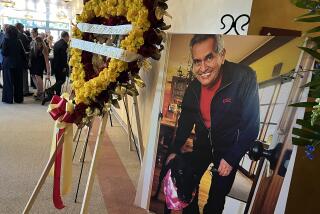Alatorre Won’t Join Race for L.A. Mayor : Politics: Councilman’s decision leaves field with no prominent Latino elected official. Intense competition for ethnic group’s votes is likely.
Los Angeles City Councilman Richard Alatorre has decided not to run for mayor, leaving a crowded early field without a single prominent Latino elected official--in a city that is 40% Latino.
Alatorre’s decision, to be announced at a news conference today, follows that of Los Angeles County Supervisor Gloria Molina, the front-runner in early polls who two weeks ago announced that she is not running. It leaves Julian Nava, former Los Angeles school board member and a onetime U.S. ambassador to Mexico, as the most prominent Latino in the race.
Alatorre’s absence is expected to set off an intense competition for Latino votes among the field--expected to number about 20 when filing to replace retiring Mayor Tom Bradley closes in early January.
Although Spanish-surname voters represent just 11% of the city’s electorate, they could be an important bloc in an April primary that is likely to split votes among so many candidates.
“You are going to find a fairly aggressive rush toward the Latino leadership to see if someone can pick up a large piece of the Latino vote,” said Richard Lichtenstein, a political consultant who ran Alatorre’s last two council campaigns. “Even though it is a small bloc, every piece helps.”
Alatorre, 49, said in a telephone interview that he decided not to run because he has work to finish on the City Council.
“I have a lot of things left I want to accomplish,” said Alatorre, who served for 14 years in the state Assembly before joining the City Council in 1985. “I’m still into what I was into when I first ran for office--a commitment to the community that I represent.”
He said he could not abandon planning for an El Sereno Youth Center and other pressing community projects. “Running for mayor would have taken a year away from my life and steered me away from the commitment I made,” Alatorre said.
He said that political concerns--and the question of whether he could expand his base beyond his Eastside council district--did not influence his decision on whether to run.
“I think I have a bigger base than anybody else does. I have worked in all the areas of Los Angeles,” he said, listing his strengths for a citywide campaign. “I don’t think money would have been an issue, because I could have raised the money.”
He also said he would have been able to line up near-unanimous support from other Latino elected officials, saying most hoped to present a united front.
Molina would have been an exception. After announcing her decision Nov. 17, Molina scoffed at the suggestion that she would back Alatorre, saying that the city needed a leader, not “anyone who enjoys the political game.”
The only prominent Latinos who might appear on the mayoral ballot are Nava, who has not won elective office in nearly 20 years, and James Blancarte, a city fire commissioner who has not decided whether to run.
Alatorre said he would like to see another “name Hispanic” enter the race, although he has not heard of any who are considering it. If one does not enter the race, he said he would consider backing another candidate.
The 14th District councilman said he will look for a candidate who is honest about what he sees as the city’s need to raise taxes to pay for services. Los Angeles is facing cutbacks, including reductions in the police and fire forces, to balance a nearly $100-million budget shortfall.
“People are lying about this,” he said. “If we are going to have a safe city and start to have a commitment to our youth, we are going to have to start pulling in some money somehow.
“We are going to have to raise taxes. That is the reality. And anybody who tries to skirt that issue isn’t being honest with the people of Los Angeles.”
A tax on trash collection or on employers for the number of workers they employ should be among the levies the city considers, he said.
Alatorre said he leaves open the possibility of a mayoral bid in 1997. But in an apparent dig at Molina--who has moved quickly from the Assembly to the City Council and then the Board of Supervisors--Alatorre added that he does not want to “jump around.”
His Assembly career was marked by a penchant for fund raising, closed-door political acumen and attentiveness to his home turf on Los Angeles’ Eastside.
Since joining the City Council in 1985, he has usually worked as a close ally of Bradley, saying in the last few years that he would consider a run for mayor only if Bradley retired.
But Alatorre, who has struggled through two failed marriages and a bout with alcoholism, said he made a “very personal decision” not to run this time around, despite urging from constituents that he run.
“It’s flattering and, in the past, it would have been hard to turn down,” he said. “But now, I’m happily married and have two wonderful sons and a commitment from the community.”
More to Read
Sign up for Essential California
The most important California stories and recommendations in your inbox every morning.
You may occasionally receive promotional content from the Los Angeles Times.










